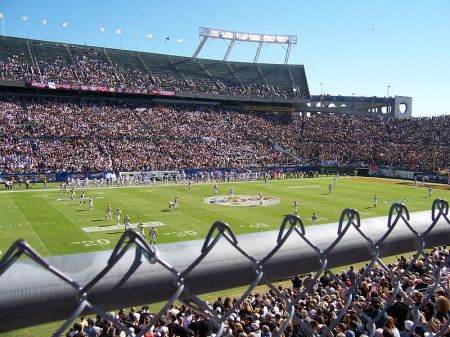Appeals court reverses decision against Christian school over football game prayer

An appeals court has reversed a decision against a Christian school that was banned from praying before a high school football game overseen by a public athletic association.
Cambridge Christian School in Tampa, Florida, was ordered not to pray over a loudspeaker system at the start of its game against University Christian School of Jacksonville in 2015.
The Christian school subsequently filed a lawsuit against the Florida High School Athletic Association.
A three judge panel of the U.S. Court of Appeals for the Eleventh Circuit issued a unanimous decision Wednesday partly reversing a district court decision against the school in the case of Cambridge Christian School, Inc. v. Florida High School Athletic Association, Inc.
Eleventh Circuit Judge Stanley Marcus wrote the court's opinion, which concluded that “the district court was too quick to dismiss all of Cambridge Christian’s claims out of hand.”
“Taking the complaint in a light most favorable to the plaintiff, as we must at this stage in the proceedings, the schools’ claims for relief under the Free Speech and Free Exercise Clauses have been adequately and plausibly pled,” wrote Marcus.
“And while we agree with the district court that the loudspeaker was a nonpublic forum, we conclude that Cambridge Christian has plausibly alleged that it was arbitrarily and haphazardly denied access to the forum in violation of the First Amendment.”
While concluding that Cambridge Christian School should be heard on those complaints, the panel also concluded that the school “failed to plead a ‘substantial burden’ under the Florida Religious Free Restoration Act because it has not alleged that the FHSAA forbade it from engaging in conduct that its religion mandates.”
“We can find nothing in the complaint, drawing every reasonable inference in favor of Cambridge Christian, that comes close to pleading a substantial burden,” he continued.
“Because Cambridge Christian did not plead — nor does it even say in its briefing to this Court — that the FHSAA forbid it from engaging in conduct that its religion mandated when it was denied access to the loudspeaker, Cambridge Christian has failed to plausibly plead a claim under FRFRA.”
First Liberty, a conservative law firm that helped to represent Cambridge Christian, celebrated the panel's ruling that reversed the lower court's decision.
“We are grateful to have won this appeal and look forward to presenting our case on behalf of Cambridge Christian School to the district court,” said Jeremy Dys in a statement released Wednesday.
“The First Amendment protects the rights of students and teachers at a private Christian school to pray before a football game, especially when both teams are Christian and have a tradition of prayer before games.”
In December 2015, Cambridge Christian and University Christian School played a 2A state championship game at the Citrus Bowl Stadium. While both teams wanted to have a prayer spoken on the loudspeaker before the game — a common practice for Cambridge Christian — the FHSAA rejected their request.
FHSAA head Roger Dearing told the schools that the Citrus Bowl Stadium "is a public facility, predominantly paid for with public tax dollars, [making] the facility 'off limits' under federal guidelines and precedent court cases."
"In Florida Statutes, the FHSAA (host and coordinator of the event) is legally a 'State Actor,' we cannot legally permit or grant permission for such an activity," Dearing said, as reported by First Coast News.
In September 2016, First Liberty and the law firm Greenberg Traurig filed suit against the FHSAA, with a magistrate court siding with FHSAA in February 2017.
In June 2017, the U.S. District Court for the Middle District of Florida Judge Charlene Edwards Honeywell affirmed the report and recommendation of the magistrate court.
“... the court agrees with the Magistrate Judge that the entirety of the speech over the stadium loudspeaker was government speech and that, even if it were not, the stadium loudspeaker is a non-public forum,” ruled Honeywell.
“Therefore, the FHSAA was permitted to deny Cambridge Christian's request to use it to broadcast prayer during a school sporting event organized and governed by a state entity.”





















